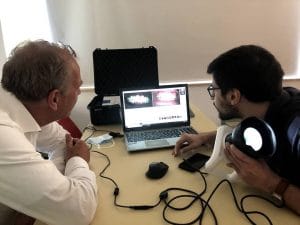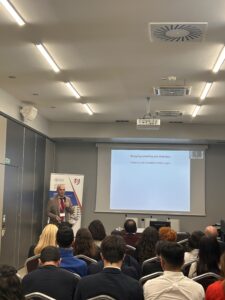The Oral Nicotine Commission has just published an extensive report exploring the impact of oral nicotine products on health and the contribution that harm reduction strategies can provide in mitigating damage to the oral cavity. Among the experts who contributed to the paper, the founder of CoEHAR, Prof. Riccardo Polosa
Cigarette smoking has an extremely negative impact on oral health: the toxic components released through combustion deteriorate the appearance of teeth and gums, contributing to cavities, bad breath, and the onset of various diseases.
Unfortunately, it is only in recent years that doctors and specialists have paid greater attention to the real impact of cigarette smoking on oral health and the positive effects of cessation.
However, smokers do not always intend to quit, nor are they able to maintain this decision in the long term. Average cessation rates paint a rather discouraging picture, with only 7-12% of individuals achieving total cessation after 12 months.
For this reason, harm reduction strategies—such as the use of modified-risk tools or nicotine-containing products without combustion—can offer an alternative solution for those who consider the appearance and health of their oral cavity a primary concern.
The Oral Nicotine Commission is an independent body made up of leading figures in the international medical, scientific and public health policy communities. The goal of the Commission is to help build the evidence base and raise awareness of Oral Nicotine among both governments, public health leaders and the public, thus countering negative, unfounded preconceptions and stereotypes.
The Commission, in collaboration with Smoke Free Sweden 2024, AsHRA (Asia Harm Reduction Alliance), AHRA (Africa Harm Reduction Alliance), PAHRA (Pan America Harm Reduction Alliance), ha just launched a groundbreaking report titled “Transforming oral health for all: the case fro tobacco harm reduction”.
This report represents a critical step in advancing scientific knowledge on alternative nicotine delivery systems and their potential to mitigate smoking-related harm. Among the distinguished authors, Prof. Riccardo Polosa, a global leader in harm reduction and founder of the CoEHAR (Center of Excellence for the Acceleration of Harm Reduction) at the University of Catania, plays a pivotal role.
The report, co-authored by Dr. Karl E. Fagerström, Dr. Caitlin Notley, Prof. Konstantinos Farsalinos, Dr. Peter Hajek, Prof. Peter M. Nilsson, and Dr. John Britton, delves into the latest evidence surrounding oral nicotine products, focusing on their potential benefits in reducing smoking-related health risks. The publication underscores the need for more informed public health policies that differentiate between combustible tobacco and alternative products, particularly oral nicotine, which eliminates harmful combustion by-products.
Prof. Polosa, a tireless advocate for evidence-based harm reduction strategies, emphasizes the importance of shifting smokers to safer alternatives:
“The findings of this report mark a major milestone in understanding the role of oral nicotine products as tools for harm reduction. Policymakers and healthcare professionals must acknowledge the significant public health opportunity presented by these alternatives.”
The report aligns seamlessly with the ongoing efforts of CoEHAR in promoting harm reduction research. Among its flagship initiatives is the SMILE Project, which examines the effects of smoking on oral health and evaluates health parameters in smokers who transition to modified-risk products. The SMILE Project has already opened new avenues for understanding how smoking cessation and the adoption of safer alternatives can lead to significant improvements in oral health.
The Oral Nicotine Commission Report and initiatives like CoEHAR’s SMILE Project reflect a shared commitment to reducing the global burden of smoking-related diseases. The report serves as a call to action for governments, healthcare systems, and public health organizations to embrace harm reduction strategies as a cornerstone of tobacco control efforts.




